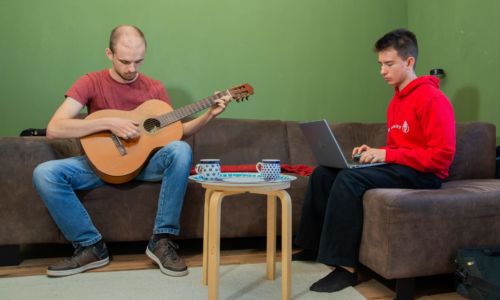Internationals face further housing issues – but now, there’s a hotline to help
-
 Calorta Tan. Photo: David van Haren
Calorta Tan. Photo: David van Haren
If one thing has become clear since the start of this study year, it probably is that the campus is more packed than ever. Especially for internationals, finding housing in biking distance is seemingly impossible. Calorta Tan from China is staying at a friend's place in Ede. ‘I was joking with my colleagues that I might be able to live at the office and take showers at the gym.’
While the housing crisis – in Nijmegen and the Netherlands – has been gaining momentum since pre-pandemic times, the first year fully back on campus is posing additional challenges – especially for Radboud’s international students. So much that the university sent out emails this summer, asking 200 of its prospective international students to not come to Radboud if they don’t have housing.
‘I received an email mentioning this in August, quite close to the start of my PhD’, says Calorta Tan. The 25-year-old has come from China for a self-funded PhD in Psychology at the Faculty of Social Science. For her, delaying the start of her PhD wasn’t an option anymore and she came anyways – without housing. At the moment, Tan is staying at a friend’s place in Ede. For October, she has found another short-term solution.
‘I check Facebook, I send emails, I sent probably around fifty emails by now, but I don’t get a reply – not even a no’
‘I was joking with my colleagues that I might be able to live at the office and take showers at the gym’, she says. ‘But right now, I can’t properly focus on my studies. The first thing I do after waking up is check all the websites, I update them throughout the day and before I go to bed, I check them again. I check Facebook, I send emails, I sent probably around fifty emails by now, but I don’t get a reply – not even a no.’
Dutch, German, Belgian
For Tan, the lower cost of living in the Netherlands in comparison to the United Kingdom, where she had another PhD offer that she turned down in favour of Radboud, was an important factor when deciding where to study. ‘Before I came to Nijmegen, I saw that you could get a room for around 400 euros, but I didn’t realise that that kind of cheap room never goes to an international student, because they would never choose you to be one of them.’
In her experience, even if a room isn’t Dutch-only, people often prefer internationals from Germany or Belgium. ‘Maybe it’s also harder for me, because I’m 25 and people might prefer younger students, which I understand’, she says. ‘But I do feel a bit disappointed.’ If it were up to Tan, she would like to stay for longer in the Netherlands. ‘I really like the Netherlands, everything besides the housing issue has been perfect.’ But if the latter can’t be solved, Tan won’t have any other choice but to go back to China.
Commuting and camping
But even for students from bordering countries, the housing situation is bad. ‘I really like everything about the university so far, the people, the campus, the atmosphere’, says Vanessa Marell from Germany. Everything, that is, besides the housing situation. Marell alternates between commuting from her hometown in Germany to Nijmegen – three hours every day – and living in a camper, half an hour biking distance from campus.

Marell only received notice that she was admitted to the Psychology programme in August. ‘I started looking immediately after receiving the email. I was told before that it would be difficult, also on the Open Day, and we were advised to start looking immediately, but it’s hard to do that when you don’t even know if you’re admitted yet.’
Sleeping in a camper won’t be an option once it becomes colder and commuting is already taking a lot of time and energy away from the 19-year-old. ‘I think it would help a lot if the university could give an indication how likely it is that you will be admitted sooner – I met someone who was admitted only the first week of classes – or if there was an option to give up your room without losing money if you do not get admitted.’
Hotline
According to Sander van der Goes (GroenLinks), Radboud student and member of the Nijmegen city council, the city council is aware of discrimination against international students: ‘When you apply to a house with other Dutch students on Facebook, you often see things like ‘only Dutch’, so we know that many internationals are really struggling because of that.’
‘Whenever someone is sleeping outside, you’re just not doing enough’
In order to get a better idea concerning the discrimination of international students on the housing market, the city council has now introduced an English hotline and information page in collaboration with Vizier, a pre-existing information point handling discrimination in Nijmegen. Via this hotline, internationals can report housing discrimination in Nijmegen.
But according to Van der Goes, there is more to the housing crisis than tackling discrimination alone – after all, the housing crisis only arose in the context of too little (social) housing development in the past decade and (social) housing being bought up by investors remaining unused. Van der Goes: ‘Housing is the first thing that you need when you come here and the fact that we are lacking in providing that is really a shame. I think we’re doing everything we can so people can get houses as fast as possible, but whenever someone is sleeping outside, you’re just not doing enough.’

